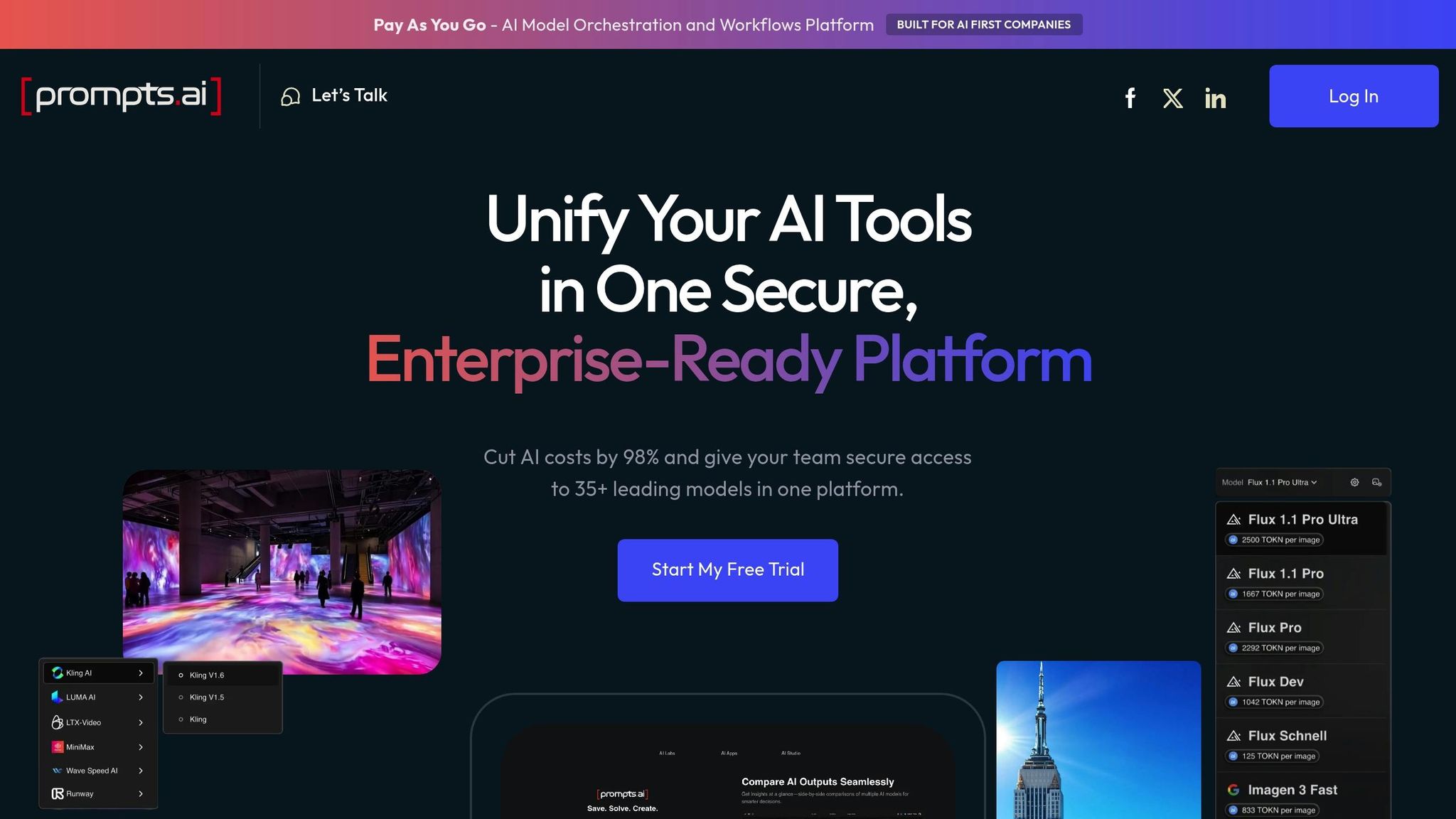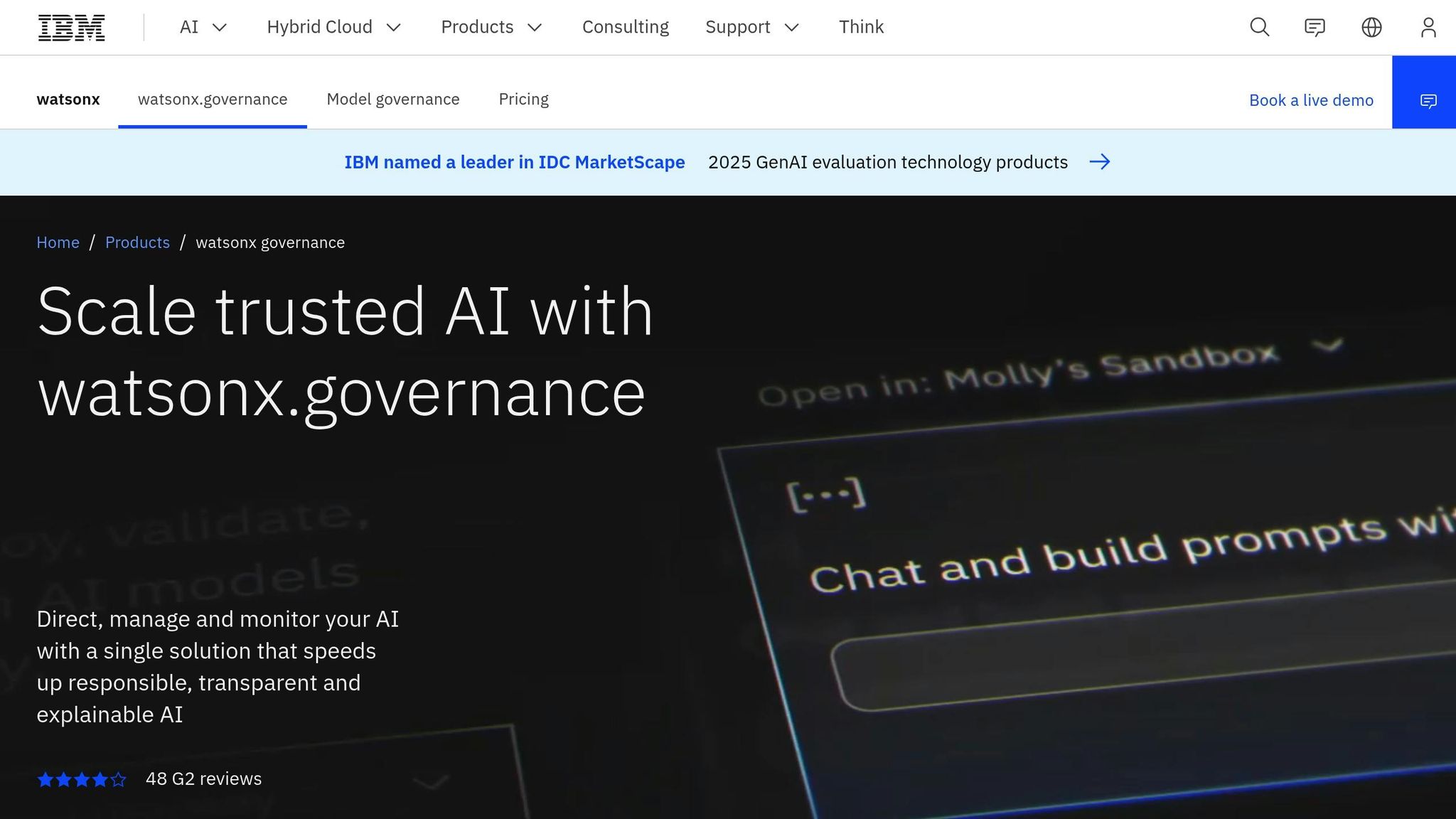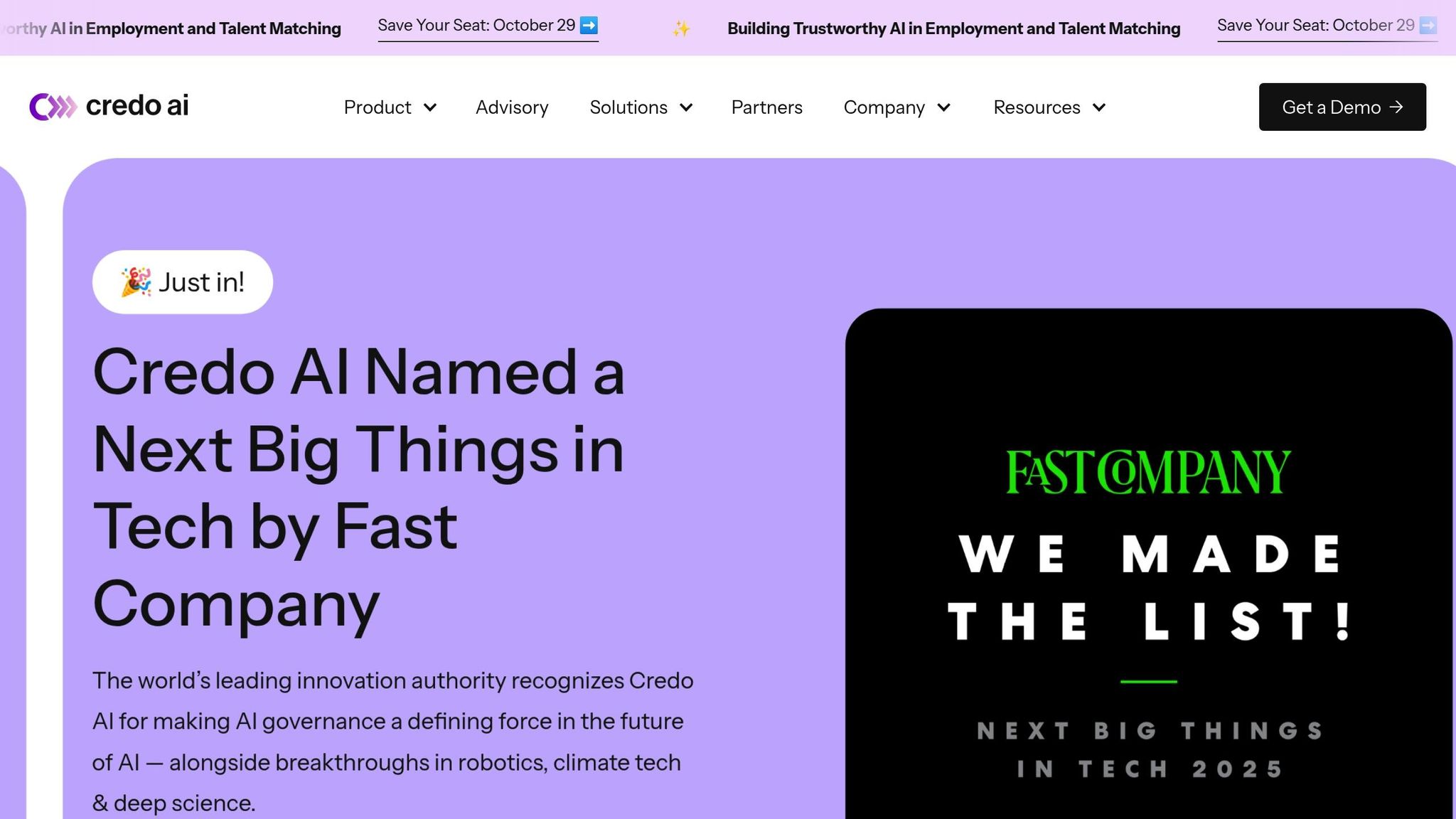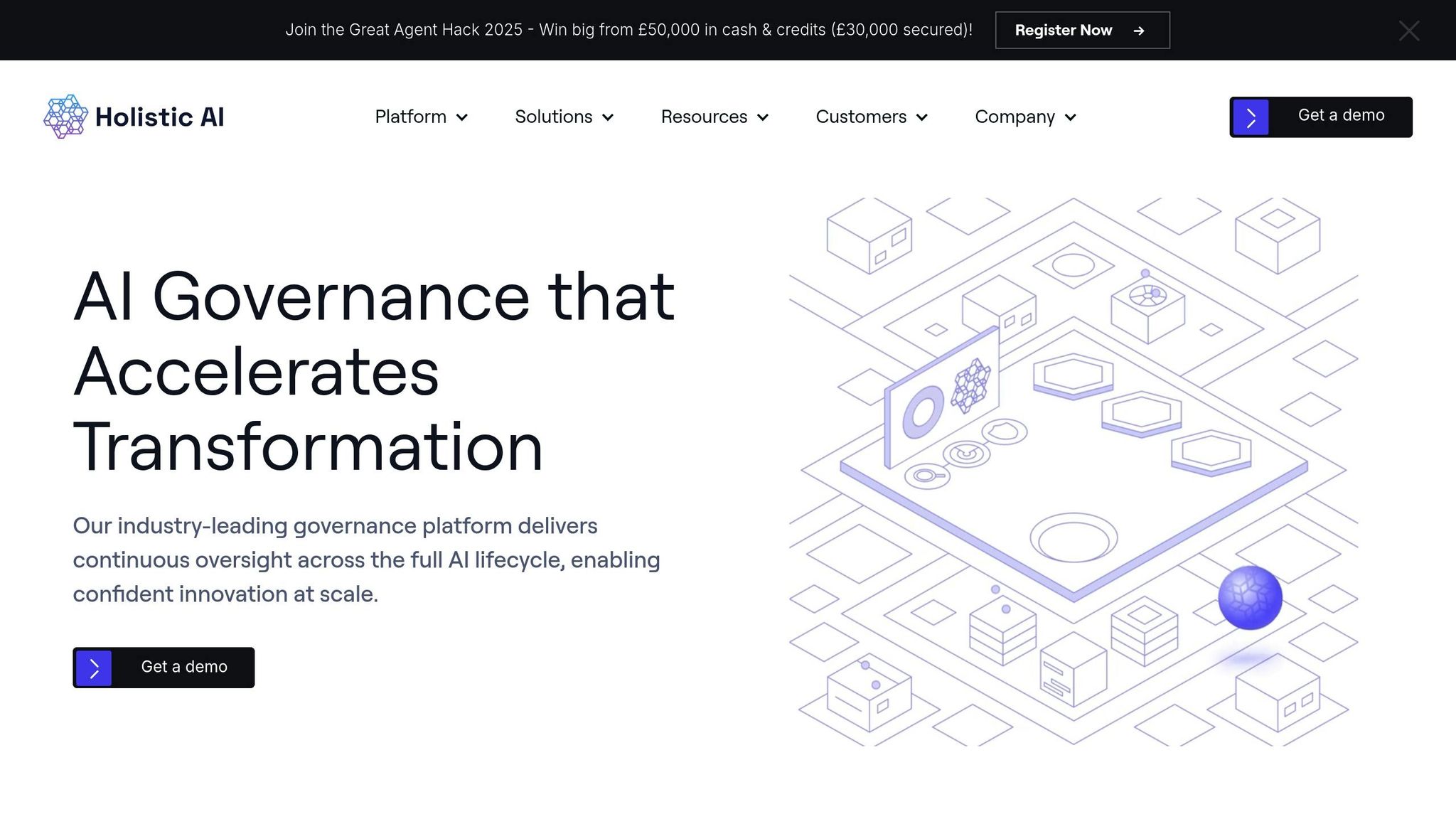
AI governance is no longer optional - it’s essential for businesses managing multiple models and navigating compliance. The rapid adoption of AI in U.S. enterprises has led to challenges like operational complexity, hidden costs, and regulatory risks. To address these issues, five platforms stand out for their ability to streamline AI management: Prompts.ai, IBM Watsonx.governance, OneTrust, Credo AI, and Holistic AI. Each offers unique solutions for governance, compliance, integration, and cost control.
| Platform | Strengths | Best For |
|---|---|---|
| Prompts.ai | Cost savings, multi-model access | Cost-conscious businesses |
| IBM Watsonx | Lifecycle management, compliance | Large enterprises |
| OneTrust | Privacy, automated monitoring | Regulated industries |
| Credo AI | Ethical AI focus, bias detection | Responsible AI practices |
| Holistic AI | Full oversight, advanced governance tools | Large-scale operations |
Choosing the right platform depends on your goals - whether it’s reducing costs, ensuring compliance, or managing ethical AI. Dive into the details to find the best fit for your needs.

Prompts.ai is a powerful AI orchestration platform designed for enterprise use, bringing together more than 35 large language models such as GPT-5, Claude, LLaMA, and Gemini. It streamlines AI management by consolidating these tools into a single, secure interface, addressing the common challenge faced by U.S. businesses: juggling multiple AI tools while maintaining control over governance, costs, and compliance.
Prompts.ai simplifies governance by unifying AI tools within a secure, enterprise-ready environment. Instead of navigating separate systems for different models, businesses can manage all their AI operations through a centralized dashboard, offering complete oversight.
The platform includes role-based access controls and approval workflows, ensuring that only authorized personnel can deploy or modify prompts. This is especially useful for organizations utilizing multiple LLMs across various departments, where maintaining consistent governance can quickly become complex.
To support effective governance, Prompts.ai offers tailored business-tier plans - Core ($99/month), Pro ($119/month), and Elite ($129/month) - which include tools for monitoring and managing AI usage at scale. These features help organizations adhere to regulations while expanding their AI capabilities, creating a unified framework that also enhances compliance efforts.
Prompts.ai prioritizes compliance by incorporating best practices from frameworks like SOC 2 Type II, HIPAA, and GDPR to ensure data security. The platform is actively engaged with Vanta for continuous control monitoring, as highlighted in their audit process:
"Per our Vanta Engagement Letter, we are actively engaged with Vanta for continuous control monitoring and have activated our SOC 2 Type 2 audit process on June 19, 2025."
This proactive compliance strategy is particularly valuable for businesses operating in regulated industries, as it ensures comprehensive audit trails to meet strict regulatory requirements.
The platform also features a Trust Center, where businesses can monitor their security posture in real time. This includes progress on policies, controls, and compliance status, offering transparency that is crucial for organizations needing to demonstrate adherence to stakeholders or regulatory bodies.
Prompts.ai integrates seamlessly with existing enterprise systems, enabling businesses to automate workflows with AI quickly and efficiently. These integrations can be deployed in seconds, avoiding the delays often associated with enterprise software implementation.
The platform supports interoperable workflows across its business plans, allowing organizations to connect AI operations to existing data sources and infrastructure without requiring major system changes. This ensures that AI workflows complement broader business processes.
Scalability is another standout feature, as the platform allows for the instant addition of models, users, and teams without creating operational chaos. Higher-tier plans include unlimited workspaces and collaborators, making it an ideal solution for growing teams. This capability empowers small teams to scale into enterprise-grade AI operations while maintaining governance and control.
One of Prompts.ai’s standout features is its ability to provide cost transparency and control. By using a unified platform and its Pay-As-You-Go TOKN credits system, businesses can cut AI software costs by up to 98%, eliminating recurring subscription fees and aligning expenses with actual usage.
The platform’s FinOps layer tracks token usage in real time, transforming fixed expenses into scalable, on-demand costs tied directly to business outcomes. This level of visibility addresses the common challenge of hidden AI expenses across multiple platforms.
With real-time cost controls and detailed usage analytics, businesses can avoid budget overruns while maximizing the value of their AI investments. This makes it easier for finance teams to predict and manage AI-related expenses, ensuring that every dollar spent delivers measurable returns.

IBM Watsonx.governance is designed to help organizations manage, monitor, and oversee AI models throughout their entire lifecycle. Leveraging IBM's extensive experience in enterprise software, this platform tackles the challenges of governing AI deployments across large organizations with multiple departments and business units.
Focused on model risk management and regulatory compliance, Watsonx.governance is particularly suited for industries like financial services, healthcare, and government, where strict regulations are the norm. Unlike basic AI tools, this platform offers advanced capabilities that ensure compliance while maintaining operational efficiency, making it a reliable choice for enterprises with high governance demands.
Watsonx.governance offers model lifecycle management, keeping track of AI models from their creation to retirement. It maintains detailed records of model performance, data origins, and decision-making processes, creating a transparent audit trail for every AI system in use.
The platform includes automated monitoring to detect performance issues, such as drift, and trigger corrective actions. This ensures AI systems remain accurate and free from biases caused by outdated data.
Organizations can define and enforce governance rules through the platform's policy enforcement tools. These policies can be tailored to meet industry regulations, internal standards, or specific compliance frameworks. The system ensures that all AI models align with these rules before and during deployment.
Watsonx.governance simplifies compliance with regulations such as SOX, GDPR, and Basel III for financial institutions, making audit preparation easier. Its explainability features provide insights into how AI models make decisions, addressing concerns about the "black box" nature of AI.
The platform also includes risk assessment tools to evaluate potential biases, fairness issues, and other risks associated with AI deployments. By identifying these risks early, organizations can avoid regulatory problems and maintain smooth operations.
Watsonx.governance integrates effortlessly with IBM Cloud infrastructure and supports connections to third-party systems through APIs and standard enterprise connectors. This flexibility allows organizations to incorporate the platform into their workflows without overhauling existing systems.
The platform supports hybrid and multi-cloud environments, ensuring governance oversight across various deployment scenarios, whether models are hosted on-premises or in the cloud. This capability is especially beneficial for enterprises operating in diverse IT environments.
With scalability built into its core, Watsonx.governance can handle everything from small-scale pilots to enterprise-wide AI deployments involving hundreds of models. It maintains the performance and reliability needed for large-scale operations.
Watsonx.governance is available through a subscription-based pricing model that adjusts to an organization's size and usage. The platform includes cost tracking and allocation tools, providing insights into the total cost of AI governance across departments and projects.
By automating compliance and monitoring tasks, the platform reduces the manual effort required, potentially lowering operational costs. This streamlined approach allows organizations to allocate resources more effectively while maintaining oversight.
Additionally, resource optimization tools help identify underutilized or redundant AI models, enabling better cost control and resource allocation. Detailed analytics on model usage patterns support informed decision-making about AI investments and resource distribution.

Building on its strong foundation in lifecycle and compliance frameworks, OneTrust has expanded its capabilities to include AI governance. Originally known for its privacy management solutions, OneTrust now equips organizations to manage AI deployments with an emphasis on ethical practices and adherence to regulatory standards.

Credo AI is an AI governance platform designed to manage risks and streamline the scaling of AI initiatives. Founded by Navrina Singh, it emphasizes trust and responsibility in AI systems, offering comprehensive oversight for generative AI, AI agents, and third-party AI vendors. From pilot projects to full-scale enterprise deployments, Credo AI ensures a structured approach to governance, compliance, integration, and cost management.
At the heart of Credo AI’s governance framework are tools for risk assessment, model validation, bias detection, and performance monitoring. These features support organizations as they transition from small-scale generative AI pilots to large enterprise deployments. The platform’s model tracking and discovery capabilities seamlessly integrate with existing MLOps workflows, offering visibility into AI assets and maintaining detailed audit trails for both internal governance and external compliance.
Credo AI also tackles the challenges of multi-model oversight, a growing concern for U.S. enterprises, by ensuring consistent governance as businesses scale their AI capabilities.
Credo AI’s compliance framework simplifies adherence to complex regulatory requirements. Its Compliance Accelerators, developed in collaboration with major tech providers, generate automated reports and audit logs to meet regulatory standards while maintaining transparency during audits.
"As AI becomes more deeply embedded in enterprise operations, it's crucial to build out a robust AI governance ecosystem. IBM's collaboration with Credo AI on Compliance Accelerators advances this goal, pooling expertise across organizations to fuel more responsible, transparent, and explainable AI." - Heather Gentile, Director of Product, IBM watsonx.governance
The platform’s risk management integration connects AI oversight with broader enterprise risk strategies, enabling organizations to incorporate AI-specific risks into their overall frameworks. This approach makes regulatory compliance more straightforward for businesses scaling their AI operations.
Credo AI integrates with MLOps tools, cloud services, model registries, and risk management systems without requiring significant infrastructure changes. Its Global Partner Program highlights key integrations, such as Microsoft Azure AI Foundry for responsible AI workflows, IBM watsonx.governance for compliance support, and Databricks MLflow for enhanced model tracking.
"AI governance is no longer a nice-to-have - it's the competitive differentiator that separates AI leaders from AI laggards. Our Partner Program brings together the best in AI tooling, cloud, data, GRC, and services to help organizations embed trust in AI and govern responsibly, at scale." - Navrina Singh, Founder and CEO, Credo AI
Custom integration services further embed governance into daily operations, with AWS infrastructure deployment ensuring compatibility with cloud environments and enterprise scalability. Organizations can start with targeted AI use cases and gradually expand governance coverage as their AI programs grow, maintaining consistent oversight across multiple AI models.
Credo AI’s pricing operates on an Enterprise Plan model, with annual subscriptions based on the number of AI use cases rather than the number of users. This structure aligns costs with actual governance needs, allowing businesses to scale their investment as they adopt more AI solutions.
For organizations with unique requirements or large-scale deployments, custom pricing options are available through direct sales. This flexible approach ensures that businesses can maintain comprehensive governance while staying within budget.

Holistic AI offers a complete solution for managing the entire AI lifecycle - from initial planning to post-deployment. As a relatively new player in the AI governance field, it focuses on a business-first approach, helping organizations establish robust oversight and internal policies while ensuring full transparency and control over their AI systems.
At the heart of the platform is a centralized command center that provides a comprehensive view of AI activities across the organization. This unified hub allows businesses to register AI projects, track their AI inventory, and maintain detailed oversight of all AI assets. Below, we explore its key features and the advantages it brings to enterprises.
Holistic AI streamlines compliance by automating the tracking of ethical and regulatory standards. Its system includes built-in risk assessment tools that identify and address potential issues throughout the AI lifecycle. A standout feature is its ability to detect and manage "shadow AI" - unauthorized or untracked AI tools within an organization. This helps mitigate risks associated with unregulated AI usage. Additionally, the platform supports monitoring, auditing, and risk management while providing role-based reporting to deliver relevant insights to specific stakeholders, all while maintaining secure audit trails.
The platform’s compliance module helps businesses stay ahead of evolving regulations by monitoring changes and enabling proactive adjustments. Automated tracking ensures detailed audit trails that document adherence to ethical guidelines and regulatory requirements. These records are invaluable for regulatory audits or internal reviews. Furthermore, Holistic AI integrates actionable risk mitigation strategies and automated workflows, enhancing efficiency without slowing down AI development processes.
Holistic AI is designed to grow alongside an organization’s needs. Its single-repository structure provides complete enterprise oversight and integrates seamlessly into diverse environments. While the platform is highly capable, it is primarily geared toward larger organizations due to its scale and complexity.
With pricing tailored for large enterprises, Holistic AI may not be a feasible option for smaller teams. Organizations should evaluate their governance needs and weigh the platform’s learning curve against its extensive capabilities before committing to its use.
Every platform comes with its own set of strengths and challenges, tailored to meet different organizational priorities. Here's a concise breakdown of what each platform brings to the table.
Prompts.ai stands out for its cost savings and variety, offering access to over 35 models while cutting costs by up to 98%. Its flexible pay-as-you-go TOKN credit system removes the burden of recurring subscription fees. The platform's unified interface simplifies prompt workflows and provides real-time cost tracking for better financial visibility.
IBM Watsonx.governance leverages IBM’s deep enterprise expertise, delivering strong lifecycle management and detailed compliance tools. With enterprise-grade security and robust support, it’s a solid choice for larger organizations. However, costs and integration challenges could arise for those not already embedded within IBM’s ecosystem.
OneTrust specializes in privacy and regulatory compliance, offering tools for risk assessment and automated monitoring. These features are especially useful for businesses in tightly regulated industries. However, companies should evaluate whether its broader focus on privacy management aligns with their specific AI governance needs.
Credo AI focuses on ethical AI deployment, emphasizing bias detection and responsible practices. Its robust algorithmic auditing tools cater to organizations committed to maintaining ethical standards. That said, its narrow focus may require supplementary tools for complete AI management.
Holistic AI provides end-to-end lifecycle management, including tools to identify and manage untracked ("shadow") AI initiatives. Its centralized command center offers a clear view of AI operations. However, its extensive features and premium pricing make it a better fit for larger organizations with advanced governance needs.
These insights underline the article’s emphasis on simplifying AI governance while keeping costs manageable for U.S. businesses.
Summary Comparison:
| Platform | Key Strengths | Main Considerations | Best For |
|---|---|---|---|
| Prompts.ai | Cost savings (up to 98%), 35+ models, pay-as-you-go pricing | Streamlined orchestration with transparent cost tracking | Cost-conscious organizations needing unified model access |
| IBM Watsonx.governance | Enterprise-grade reliability, lifecycle management | Potentially higher costs and integration challenges outside the IBM ecosystem | Large enterprises already using IBM infrastructure |
| OneTrust | Expertise in privacy and compliance, automated monitoring | May not fully address AI-specific governance needs | Regulated industries focusing on data privacy |
| Credo AI | Ethical AI focus, bias detection tools | Limited scope may require additional governance tools | Businesses prioritizing responsible AI practices |
| Holistic AI | Comprehensive lifecycle management, centralized control | Complexity and higher pricing may pose challenges | Large organizations with advanced governance frameworks |
This comparison table outlines the pricing models and key considerations across platforms, helping organizations make informed decisions based on their specific needs.
The AI governance sector is on a fast track, with projections estimating it will hit $5.8 billion and grow at an impressive 45.3% CAGR from 2024 to 2029. This growth rate far surpasses the broader AI industry's 30.6% CAGR forecasted for 2025 to 2032. Such rapid expansion highlights the pressing need for unified and effective governance solutions.
Different platforms cater to varied business needs within this evolving landscape. Prompts.ai stands out by offering substantial cost savings and consolidated access to leading models through a transparent, pay-as-you-go system. It eliminates the inefficiencies of managing multiple tools while ensuring enterprise-grade security and governance. For organizations operating within IBM's ecosystem, IBM Watsonx.governance delivers seamless integration with existing workflows, making it an ideal choice for AI workflow management.
Other platforms address specific needs: OneTrust is tailored for businesses in heavily regulated industries focused on privacy compliance, while Credo AI specializes in ethical AI practices. Meanwhile, Holistic AI provides large enterprises with comprehensive oversight, meeting the demands of more complex operations.
Choosing the right platform requires careful consideration. Businesses should prioritize tools that integrate smoothly with existing MLOps and data systems to optimize workflows. For organizations under strict regulatory scrutiny, platforms offering automated compliance tracking and audit-ready reporting - aligned with global standards like the EU AI Act and NIST RMF - are critical.
Ultimately, successful AI governance depends on aligning platform capabilities with specific business goals. Whether the priority is cutting costs, ensuring compliance, or upholding ethical AI practices, the right governance framework will enable organizations to scale their AI efforts effectively. As the industry continues to advance, businesses that establish solid governance today will be well-positioned to lead tomorrow.
When selecting an AI governance platform, it's essential to focus on several critical factors. Start by pinpointing your specific requirements, considering how AI is utilized within your organization, the nature of the data being handled, and the scale of your operations. Don't overlook the importance of aligning with ethical standards and adhering to regulations such as GDPR, CCPA, or HIPAA.
Next, take a close look at the platform's capabilities. Prioritize features like data privacy, security, and explainability. Opt for solutions that provide real-time monitoring, automated risk alerts, and smooth integration with your current workflows and IT systems. Lastly, make sure the platform can scale with your business, adapt to evolving regulations, and support multiple departments to meet your organization's growth needs.
Prompts.ai streamlines the management of AI expenses with its integrated FinOps layer, delivering real-time insights into usage, spending, and return on investment (ROI). This enables businesses to track and adjust their AI-related costs with greater precision.
The platform also prioritizes compliance by offering powerful tools for governance and monitoring. These features support businesses in maintaining transparency, meeting regulatory requirements, and implementing AI responsibly within their operations.
AI governance plays a critical role for businesses in highly regulated industries, as it ensures adherence to stringent legal and ethical standards. Sectors such as finance, healthcare, and law face unique challenges, including safeguarding privacy, maintaining safety protocols, and addressing ethical concerns when deploying AI systems. Proper governance not only helps avoid legal complications but also reinforces public trust.
By establishing strong governance frameworks, companies can manage AI systems responsibly, promoting transparency, fairness, and accountability in their operations. With regulations like the EU's AI Act introducing stricter guidelines for high-stakes industries, businesses must adopt well-structured strategies to meet these requirements while maximizing the advantages AI can offer.


